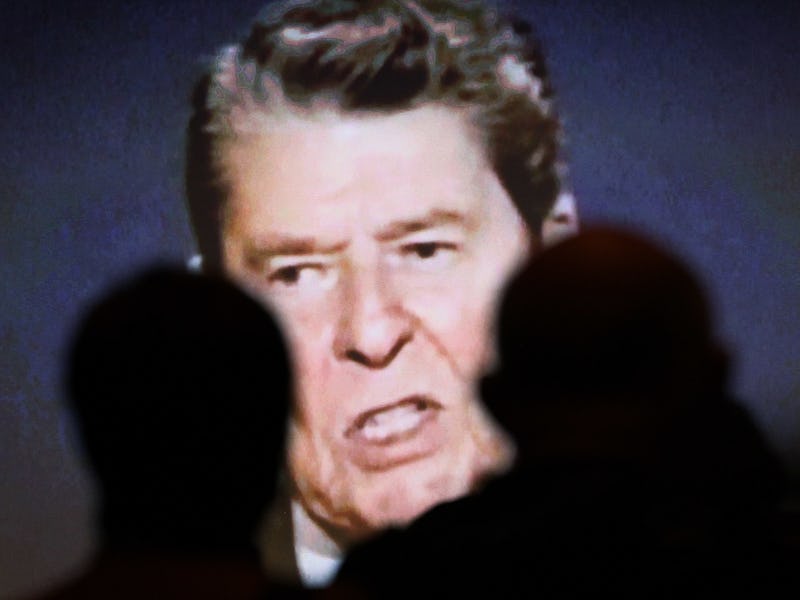What Ronald Reagan's "Evil Empire" Speech Says About Season 4 of 'The Americans'
The use of the speech in the Season 3 finale points to the significance of Paige's Christian conversion.

Never underestimate how often, in the course of American history, God and even Jesus Christ himself have entered into key presidential rhetoric. Ronald Reagan’s 1983 “Evil Empire” speech is one of the most famous political speeches of the Cold War era, and the Bible is a much bigger part of it than nukes. In the half-hour diatribe, the president not only characterizes Communism as a threat to Western democracy and capitalism, but also as a threat to the country’s moral fabric. There are long, fiery passages that it’s hard to credit ever made it to final draft:
“A number of years ago, I heard a young father, a very prominent young man in the entertainment world, addressing a tremendous gathering in California. It was during the time of the Cold War, and Communism and our own way of life were very much on people’s minds. And he was speaking to that subject. And suddenly, though, I heard him saying, ‘I love my little girls more than anything — —.’ And I said to myself, ‘Oh, no, don’t. You can’t — don’t say that.’ But I had underestimated him. He went on: ‘I would rather see my little girls die now, still believing in God, than have them grow up under communism and one day die no longer believing in God.’
“There were thousands of young people in that audience. They came to their feet with shouts of joy. They had instantly recognized the profound truth in what he had said, with regard to the physical and the soul and what was truly important.”
It’s no accident that a segment of the “Evil Empire” speech plays in the closing moments of the Season 3 finale of FX’s The Americans; in a way, the text helps to unify all of the separate turmoils which are driving the show forward. While a news broadcast about Reagan’s speech plays, we see Paige calling Pastor Tim, and Philip and Elizabeth interrupt a heated debate to watch. As the broadcaster (Cronkite?) describes it, Reagan’s speech is notable for “casting” the Soviet conflict “in moral terms.”
The explicitly Christian segments are left out of the clip we see in the episode, but they were at the heart of Reagan’s fear-mongering. The speech, after all, was delivered to the National Association of Evangelicals in Orlando. The “evil empire” term, first used here, became notorious in the years following, shorthand used when referring to the accelerating tension between Russia and the United States.
The fact that Paige becomes so deeply involved with Christianity during this cultural moment is more than just a simple plot device: Reagan often positioned Communism in direct opposition to Christian morals. There would be no rebellious play Paige could make that would try Philip and Elizabeth’s patience more than devoting herself to nu-Protestant evangelism. in Season 3 — especially in Philip’s biggest tirade of the series — we see evidence of this:
The 1980s also saw a particular development in youth groups’ focus on counseling within ministries. Paige’s almost uncomfortably close relationship with Pastor Tim and his wife is indicative of this trend. It makes the fact that she would feel compelled to reveal her parents’ identities to him all the more creditable, and her level of devotion to her parents unclear. Pastor Tim’s long hair, casual dress, and affinity for pop music is indicative of a hip, youth-friendly strain in Christian ministries that would have still been young in the early ’80s — only about 15 years old. Business was booming, as Reagan mentions in the exposition of his 1983 speech:
“There’s a great spiritual awakening in America, a renewal of the traditional values that have been the bedrock of America’s goodness and greatness.
“One recent survey by a Washington-based research council concluded that Americans were far more religious than the people of other nations; 95 percent of those surveyed expressed a belief in God and a huge majority believed the Ten Commandments had real meaning in their lives. And another study has found that an overwhelming majority of Americans disapprove of adultery, teenage sex, pornography, abortion, and hard drugs. And this same study showed a deep reverence for the importance of family ties and religious belief.”
Reagan’s rhetoric rarely got more explicitly religious, or pointedly anti-Russian, than it did in this March 1983 speech. The dramatic use of it in last season’s finale suggests that — as at the beginning of Season 1 when Stan joins the FBI in D.C. — another make-or-break moment is coming in the show. The morality-threatening Soviet crisis, in Reagan’s mind, at its apex, as are Paige and Philip’s private conundrums. As Paige struggles to come to grips with her parents’ revelation, Philip grapples with his own conflicted feelings by butting heads with Gabriel and secretly attending EST seminars. As Reagan puts it:
“While America’s military strength is important, let me add here that I’ve always maintained that the struggle now going on for the world will never be decided by bombs or rockets, by armies or military might. The real crisis we face today is a spiritual one; at root, it is a test of moral will and faith.”
This underlines the conflict that is at the center of the family drama in The Americans, as well as the worldwide political conflict. Everyone’s faith is being tested, and the weight of the particular paranoias and obsessions of the historical moments is there behind them, sinking the ship. One wonders if The Americans can go further than one more season; the moment of exposure for Philip and Elizabeth feels far too close, or at least, his moment of succumbing to his own doubt and guilt.